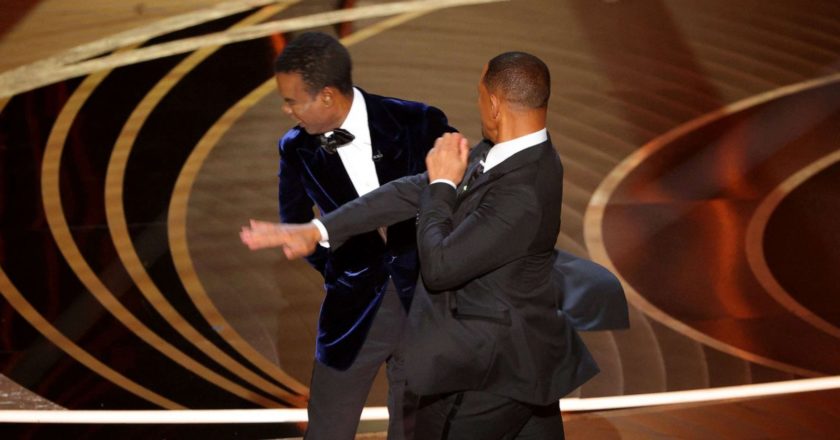On March 27, 2022, the world watched in suspense as actor Will Smith slapped comedian Chris Rock across the face on live television during the 94th Academy Awards ceremony, more commonly referred to as the Oscars. This prestigious ceremony annually celebrates international cinematic achievements; however, this year, the most noteworthy event of the night was a shocking moment of violence between two supposed friends.
Prior to the strike, the mood of the Oscars was good-spirited. The audience laughed whole-heartedly as Chris Rock entertained them with his prewritten jokes. The performance ran smoothly until Rock made a joke about Jada Smith, Will Smith’s wife, saying, “Jada, I love you. G.I. Jane two, can’t wait to see you.” The joke was meant to compare Jada, who recently shaved her head due to alopecia, to the female protagonist of the movie G.I. Jane, who also has a shaved head. The audience seemed to sense the controversiality of the joke, as murmurs of uneasiness mixed with awkward laughter.
While finding it funny at first, Smith quickly became angered after seeing Jada’s displeased expression. He then walked up onto the stage, and much to everyone’s surprise, struck Chris Rock’s face, and then promptly returned to his seat. Smith continued, repeatedly shouting, “Keep my wife’s name out of your f*cking mouth!” The ceremony seemingly moved past the assault after a long moment of silence among attendants and awards were presented. Will Smith went on to win his first Oscar for his portrayal of Richard Williams in “King Richard,” the father of tennis superstars Venus and Serena.
Though the Academy punished Will Smith for his violent actions by giving him a ten-year ban, many are unsatisfied with the situation’s outcome. The controversial event reveals complicated aspects of Will Smith’s history while overshadowing other noteworthy moments, such as Deaf actor Troy Kotsur’s Oscar. To add to the controversy, the ten-year ban inflicted on Will Smith is seen by some as selective and performative by the Academy, as they have not punished past actors who have committed greater offenses.
Regarding Will Smith’s history, actor Paul Rodriguez claims to have experienced unrelenting verbal abuse from co-star Will Smith on the set of the 2001 movie “Ali.” Rodriguez, who was cast as the role of Muhammad Ali’s physician, Dr. Ferdie Pacheco, revealed that due to pressures while filming, Smith began to take his anger out on Rodriguez. He recalls while shooting scenes, Smith threatened him, saying, “You better be careful, you’re far away from anyone who likes you. Ain’t no Mexicans here in Africa.” Rodriguez reports the mental strain of enduring Smith’s cruel treatment throughout the duration of filming, concluding that Smith’s actions made the experience transform from “one of the happiest moments of my life, to a horrible situation.” His account of Smith’s behavior offers insightful background to Smith’s violent outburst at the Oscars.
Shifting back to recent events, Deaf actor Troy Kotsur made history this year after receiving an Oscar for his role in “CODA,” becoming the first Deaf performer to win an Academy Award in the best supporting actor category. Kotsur’s win was meant to be a cover story for the Oscars and a monumental moment for the Deaf community; however, Smith’s actions quickly dominated all media coverage and became the defining moment of the 2022 Oscars, thus burying Kotsur’s accomplishment and the pride brought to the Deaf community.
While violence in any form is an unacceptable method to resolve discrepancies, responses to Will Smith’s slap inappropriately over-exaggerate both sides of the story. In our opinion, it was completely unprofessional and unnecessary for Smith to violently interrupt Chris Rock’s performance over an unsavory joke. There was no need for such a public display of “love,” as Will Smith called it; he could have easily handled the situation in a civil manner without violence.
Nonetheless, large media centers and society’s cultural attraction to dramatic events like this unnecessarily amplify the issue. Following the Oscars, Will Smith’s slap became the most memorable part of the night, with prominent figures within society weighing in with their opinions. Whether you believe Smith’s actions were dangerous, like comedian Judd Apatow, who claimed Smith’s “pure out-of-control rage and violence” could have “killed” Chris Rock, or conversely, the slap was justified by the insensitivity of the joke; it is clear the thirst for a breaking-news story overshadowed far more important moments of the night.
Moving on, the Academy’s decision to place a ten-year ban on Will Smith has been met with mixed reactions. At first glance, the ban seems like an appropriate response from the Academy, emphasizing a quick implementation of justice. However, others view this punishment as disproportionate in comparison to the treatment of other past, convicted Oscar winners. These famous actors and directors, who were all hailed by the Academy, include Roman Polanski, who had unlawful sex with a thirteen-year-old girl among other horrific offenses; Bill Cosby, who was convicted of three counts of sexual assault; and Harvey Weinstein, who was accused of sexual assault by multiple women. All three were allowed to participate in the Oscars for years after conviction, before their eventual expulsion from the Academy due to public backlash. In contrast, the Academy’s response to Will Smith’s questionable slap was immediate and long-lasting. This leads us to wonder: how justified was the Academy’s ten-year ban on Will Smith?
For average social-media users like ourselves, breaking-news articles and cover stories over radicalize the issue of Will Smith and Chris Rock, giving us the incentive to blindly choose a side. However, after deeper exploration of the many nuances surrounding the situation, we discovered many underlying factors make this issue much more complex than it seems, and perhaps there are other players besides Will Smith, like the Academy, who should be liable to public criticism.

